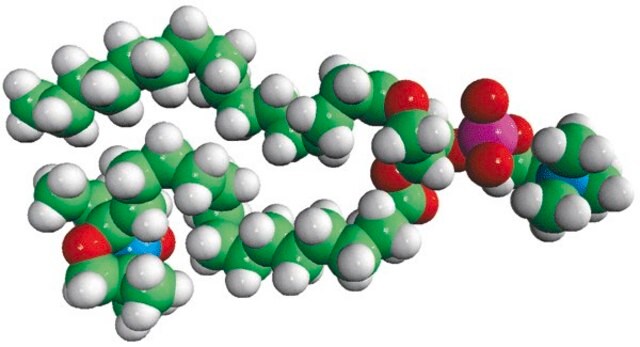810601P
Avanti
16:0-5 Doxyl PC
Avanti Research™ - A Croda Brand 810601P, powder
Sinonimo/i:
1-palmitoyl-2-stearoyl-(5-doxyl)-sn-glycero-3-phosphocholine
Autenticatiper visualizzare i prezzi riservati alla tua organizzazione & contrattuali
About This Item
Formula empirica (notazione di Hill):
C46H90N2O10P
Numero CAS:
Peso molecolare:
862.19
Codice UNSPSC:
41141825
NACRES:
NA.25
Prodotti consigliati
Saggio
>99% (TLC)
Forma fisica
powder
Confezionamento
pkg of 1 × 1 mg (810601P-1mg)
Produttore/marchio commerciale
Avanti Research™ - A Croda Brand 810601P
Tipo di lipide
ESR probes
phospholipids
Condizioni di spedizione
dry ice
Temperatura di conservazione
−20°C
Descrizione generale
Avanti′s nitroxide spin product listing is a group of compounds designed to act as membrane probes. A variety of positions down the hydrophobic chain are labeled with the nitroxide functional groups to allow probing the membrane at various depths. These compounds have been synthesized from 1-palmitoyl-2-hydroxy-sn-glycerol-3-phosphocholine with the product being purified by column chromatography. Various n-doxyl phosphocholines have been recently used as biophysical tools to elucidate membrane trafficking with phosphatidylinositol transfer proteins and as fluorescent quenchers in lipid bilayer structural studies.
Phosphatidylcholine (PC), a strong bilayer-forming lipid is the most common phospholipid in mammalian membranes. The excretory and secretory products of helminths has a small hapten-like portion called phosphorylcholine (PC). The 5th carbon of the sn-2 stearic acid chain of 1-palmitoyl-2-stearoyl-(5-doxyl)-sn-glycero-3-phosphocholine analog has a Doxyl PC, a spin probe attached to it covalently.
Applicazioni
16:0-5 Doxyl PC may be used:
- as a component in virus-like large unilamellar vesicles (VL LUVs) to quench 4-chloro-7-nitrobenz-2-oxa-1,3-diazole (NBD) fluorescence emission
- in the preparation of multi-lamellar vesicles (MLVs) as a site-specific quencher to perform fluorescence quenching studies
- in the preparation of spin-labelled multi-lamellar vesicles (MLVs)
Azioni biochim/fisiol
Phosphatidylcholine (PC) lowers the levels of cholesterol and triglycerides.
Confezionamento
5 mL Clear Glass Sealed Ampule (810601P-1mg)
Nota sulla preparazione
Product use: To prevent aggregation, prepare water-based solutions of 2 mM stock solutions of n-DOXYL PCs and store in plastic. Dilute stock solutions to 0.03- 0.1 mM solutions for EPR studies. For liposome preparations in fluorescent quenching measurements, dissolve the doxyl lipid in 150 μl absolute ethanol for a concentration of 40.3 mM , Additional supplemental information.
Note legali
Avanti Research is a trademark of Avanti Polar Lipids, LLC
Comunemente ordinati con questo prodotto
N° Catalogo
Descrizione
Determinazione del prezzo
Codice della classe di stoccaggio
11 - Combustible Solids
Certificati d'analisi (COA)
Cerca il Certificati d'analisi (COA) digitando il numero di lotto/batch corrispondente. I numeri di lotto o di batch sono stampati sull'etichetta dei prodotti dopo la parola ‘Lotto’ o ‘Batch’.
Possiedi già questo prodotto?
I documenti relativi ai prodotti acquistati recentemente sono disponibili nell’Archivio dei documenti.
The Membranes of Cells (2016)
Host defenses to helminths
Clinical Immunology, 367-377 (2013)
Ultra-stable temperature control in EPR experiments: thermodynamics of gel-to-liquid phase transition in spin-labeled phospholipid bilayers and bilayer perturbations by spin labels
Alaouie AM, et. al.
Journal of Magnetic Resonance, 182, 229-238 (2006)
Local polarity and hydrogen bonding inside the Sec14p phospholipid-binding cavity: high-field multi-frequency electron paramagnetic resonance studies.
Smirnova TI, et al.
Biophysical Journal, 92, 3686-3695 (2007)
Jihong Bai et al.
Nature structural & molecular biology, 11(1), 36-44 (2004-01-14)
Synaptotagmin-1 (syt), the putative Ca2+ sensor for exocytosis, is anchored to the membrane of secretory organelles. Its cytoplasmic domain is composed of two Ca2+-sensing modules, C2A and C2B. Syt binds phosphatidylinositol 4,5-bisphosphate (PIP2), a plasma membrane lipid with an essential
Il team dei nostri ricercatori vanta grande esperienza in tutte le aree della ricerca quali Life Science, scienza dei materiali, sintesi chimica, cromatografia, discipline analitiche, ecc..
Contatta l'Assistenza Tecnica.







